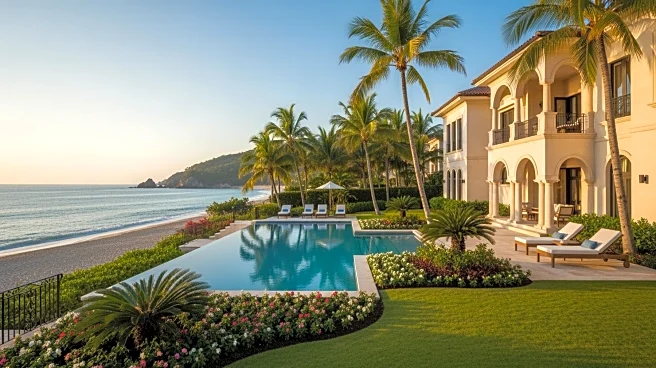What's Happening?
COMO Hotels and Resorts is set to reopen the historic Le Beauvallon hotel on April 24, 2026, marking its return as a prominent destination on the French Riviera. Originally built in 1914, the hotel underwent
a meticulous restoration and reopened in 2015 as a private estate. Now, it will operate as COMO Le Beauvallon, offering luxury accommodations and amenities. The hotel is situated on a ten-acre estate with views of the Gulf of Saint-Tropez, featuring a bayside pool, restaurant, and beach club. Guests can enjoy speedboat rides to nearby attractions, including Saint-Tropez and the beaches of Ramatuelle and Pampelonne. The hotel also boasts a collection of contemporary art, a gym, and COMO Shambhala treatment rooms.
Why It's Important?
The reopening of COMO Le Beauvallon signifies a significant addition to the luxury hospitality market on the French Riviera, a region known for its high-end tourism. This development is likely to attract affluent travelers seeking exclusive experiences, thereby boosting local tourism and economy. The hotel's unique offerings, such as its art collection and wellness services, cater to a niche market of luxury travelers. Additionally, the presence of COMO Hotels and Resorts in this iconic location enhances the brand's prestige and expands its footprint in Europe, potentially influencing the competitive landscape of luxury hospitality in the region.
What's Next?
As COMO Le Beauvallon prepares to welcome guests, the hotel is expected to draw significant attention from luxury travelers and event planners. The unique combination of historical charm and modern luxury may set new standards for hospitality in the region. The hotel's management will likely focus on marketing its exclusive services and experiences to attract high-profile guests and events. Additionally, the reopening may prompt other luxury brands to enhance their offerings to compete in the Riviera's competitive market.
Beyond the Headlines
The reopening of COMO Le Beauvallon also highlights the growing trend of restoring historic properties to cater to modern luxury travelers. This approach not only preserves cultural heritage but also offers unique experiences that differentiate such properties from contemporary hotels. The integration of art and wellness into the hotel's offerings reflects a broader shift in the luxury market towards holistic and culturally enriched experiences. This trend may influence future developments in the hospitality industry, encouraging more brands to incorporate similar elements into their properties.











